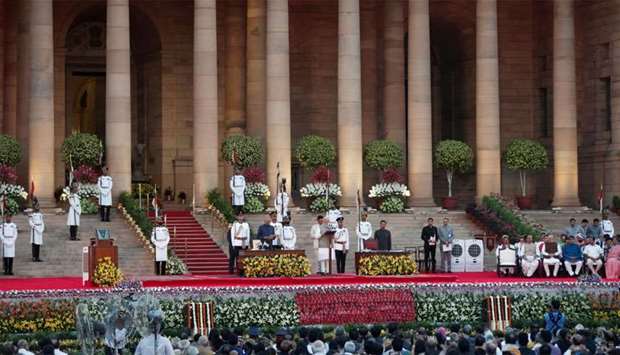Narendra Modi was sworn in as prime minister of India for the second time on Thursday after his Hindu nationalist Bharatiya Janata Party (BJP) scored a landslide victory in general elections.
President Ram Nath Kovind administered the oath of office to Modi, 68, and his council of ministers in front of more than 6,000 guests on the forecourt of the presidential palace in New Delhi on a sweltering summer's evening.
BJP president Amit Shah, who is seen as chief architect of the party's sweeping win in the general elections, was among the ministers sworn in as a member of Modi's cabinet.
The BJP won a whopping 303 seats in the Lok Sabha, or lower house of parliament, bettering its score of 282 in 2014.
The opposition Indian National Congress was the next-largest party, trailing far behind with 52 lawmakers.
Several members of Modi's former cabinet made a return, with the exception of former finance minister Arun Jaitley and foreign minister Sushma Swaraj. Both did not contest the elections on grounds of poor health.
Jaitley played a key role in Modi's first-term pushing through important reforms and acting as a troubleshooter.
The new Modi government faces tough challenges on the economic front after it failed in its first term to boost a sluggish economy.
There were several new faces, including that of former top bureaucrat of the Foreign Ministry S Jaishankar, who has been ambassador to China and headed the Americas desk at the ministry.
Elected lawmakers from the BJP's main allies have also been included in the council of ministers.
A host of regional leaders, including presidents of Sri Lanka, Bangladesh and Myanmar and the prime ministers of Nepal, Bhutan and Mauritius, were present at the inaugural. Thailand sent a special envoy.
India's political leaders, including the Congress party's Rahul Gandhi and Sonia Gandhi, and an array of film stars, ace sportsmen, celebrities and business and spiritual leaders also attended.
Modi began his day with visits to the memorials of Mahatma Gandhi, the father of India's independence movement, and former prime minister and BJP leader Atal Bihari Vajpayee.
He also visited the National War Memorial near India Gate.
Modi's massive mandate came on the heels of a terrorist attack in Pulwama in Kashmir, in which 40 Indian paramilitary soldiers died and which was followed by an airstrike by India on what it claimed was a militant-training camp in Pakistan.
The Pulwama attack and India's response led to an escalation of tensions between nuclear-capable neighbours India and Pakistan.
Prime Minister Imran Khan of Pakistan was not invited to the Modi 2.0 inaugural, unlike in 2014, when then-premier Nawaz Sharif was a star attraction.
Victims of the troopers killed in Pulwama were among those invited to the ceremony.
Tight security was in place for the inauguration ceremony, with more than 10,000 police and paramilitary soldiers forming a multilayered security ring.

